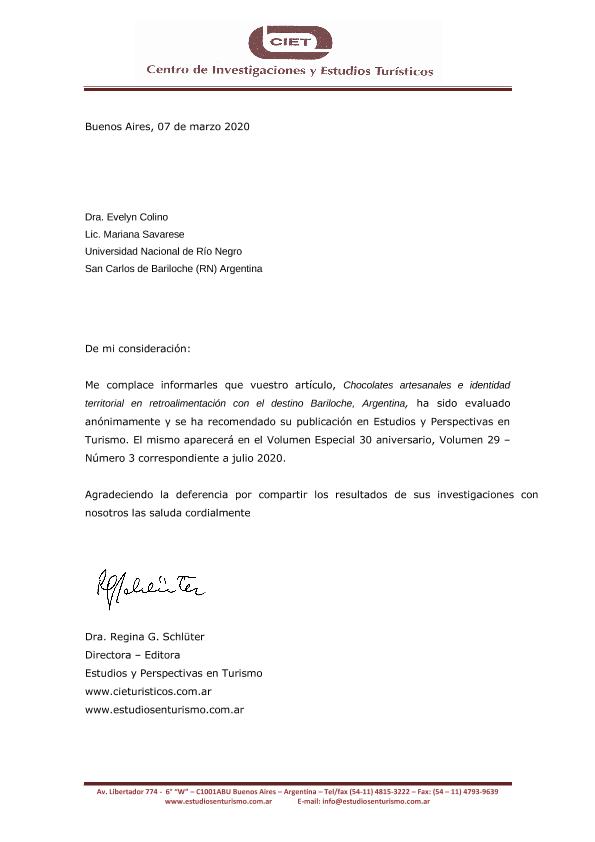Artículo
Associated with the rigorous weather of the Patagonian region and with the assistance of European immigrants, artisanal chocolate has become a symbol of Bariloche, the well-known international tourist destination of Argentina. Its production is a tradition transmitted from generation to generation. Today, Bariloche brand is a seal of quality, exclusivity and holds an image associated with the landscape beauties of the environment and even a lifestyle. Local culinary traditions are well recognized, but craft chocolate, -and the popularity achieved by some innovations created by a family of immigrants pioneer in this field-, is possibly the star product of the region. The process by which this product develops a strong territorial identity is particularly striking given that the Patagonian region is not a cocoa producer. However, there are no socio-economic studies on this case so far. From a territorial approach, this research emphasizes the chocolate-territory linkage and the association of this product to the regional tourist system. Based on the first survey carried on in this sector, the production system of Bariloche's artisanal chocolate is analyzed. Its evolution associated with the history of the place, strong profile and the marked heterogeneity between producers, innovation, expansion strategies, main opportunities, restrictions to enhance its competitive and comparative advantages in a globalized market with new demands and preferences. Asociado a la rigurosidad del clima patagónico y de la mano de inmigrantes europeos, el chocolate artesanal se ha convertido en un símbolo del destino turístico internacional Bariloche y de una tradición que se transmite de generación en generación. Hoy la marca Bariloche es un sello de calidad, exclusividad y detenta una imagen asociada a las bellezas paisajistas del entorno e incluso un estilo de vida. Las tradiciones culinarias del territorio tienen gran reconocimiento en general, pero el chocolate artesanal, -y la popularidad alcanzada por el chocolate en rama, una innovación local creada por una familia de inmigrantes pionera en el rubro-, es posiblemente el producto estrella de la región. El proceso por el cual este producto desarrolla una fuerte identidad territorial resulta particularmente llamativo si se tiene en cuenta que la región de los Andes Patagónicos no es productora de cacao. No obstante, no existen hasta el momento estudios socio-económicos sobre el caso. Desde un enfoque territorial, esta investigación enfatiza el vínculo chocolate-territorio a partir de la asociación del producto al sistema turístico de la región. A partir del primer relevamiento realizado sobre el sector, se analiza la trama productiva del chocolate artesanal barilochense, su evolución asociada a la historia del lugar, el perfil socio-productivo de las empresas y la marcada heterogeneidad entre productores, sus recientes estrategias de innovación y expansión y las principales oportunidades y restricciones para potenciar no sólo sus ventajas comparativas, sino también competitivas en un mercado mundial globalizado con nuevas exigencias y preferencias.
Chocolates artesanales e identidad territorial en retroalimentación con el destino Bariloche, Argentina
Título:
Feedback processes between craft chocolates, territorial identity and the tourist destination of Bariloche, Argentina
Fecha de publicación:
07/2020
Editorial:
Centro de INvestigaciones y Estudios Turísticos
Revista:
Estudios y Perspectivas en Turismo
ISSN:
0327-5841
e-ISSN:
1851-1732
Idioma:
Español
Tipo de recurso:
Artículo publicado
Clasificación temática:
Resumen
Palabras clave:
turismo
,
desarrollo territorial
,
identidad territorial
,
chocolate
Archivos asociados
Licencia
Identificadores
Colecciones
Articulos(CCT - PATAGONIA NORTE)
Articulos de CTRO.CIENTIFICO TECNOL.CONICET - PATAGONIA NORTE
Articulos de CTRO.CIENTIFICO TECNOL.CONICET - PATAGONIA NORTE
Citación
Colino, Evelyn del Valle; Savarese, Mariana; Chocolates artesanales e identidad territorial en retroalimentación con el destino Bariloche, Argentina; Centro de INvestigaciones y Estudios Turísticos; Estudios y Perspectivas en Turismo; 29; 3; 7-2020; 749-769
Compartir




